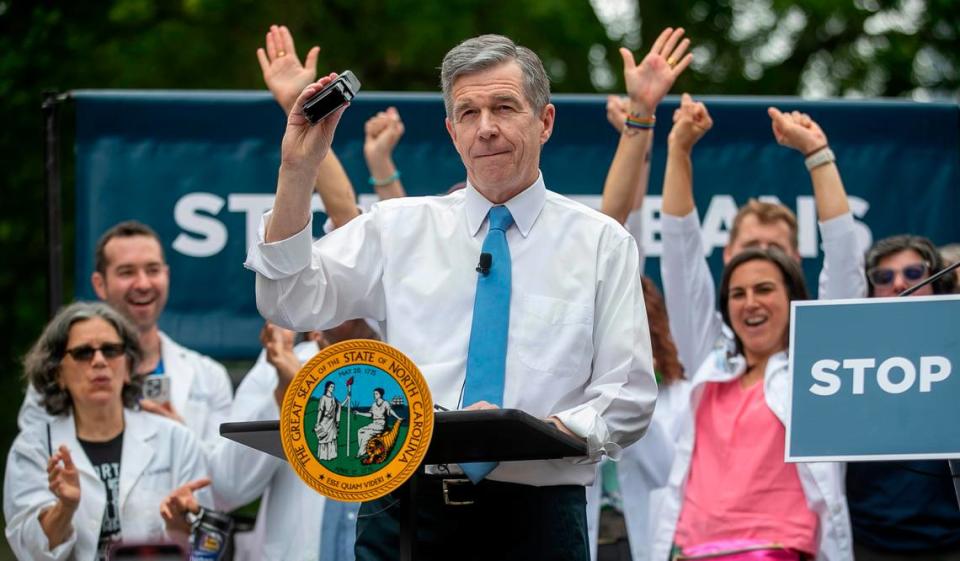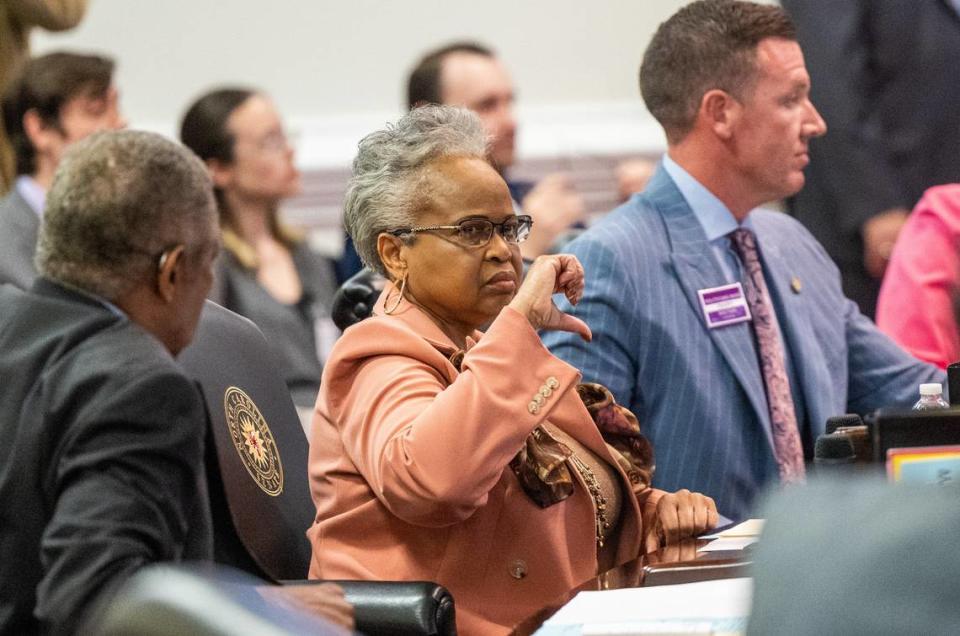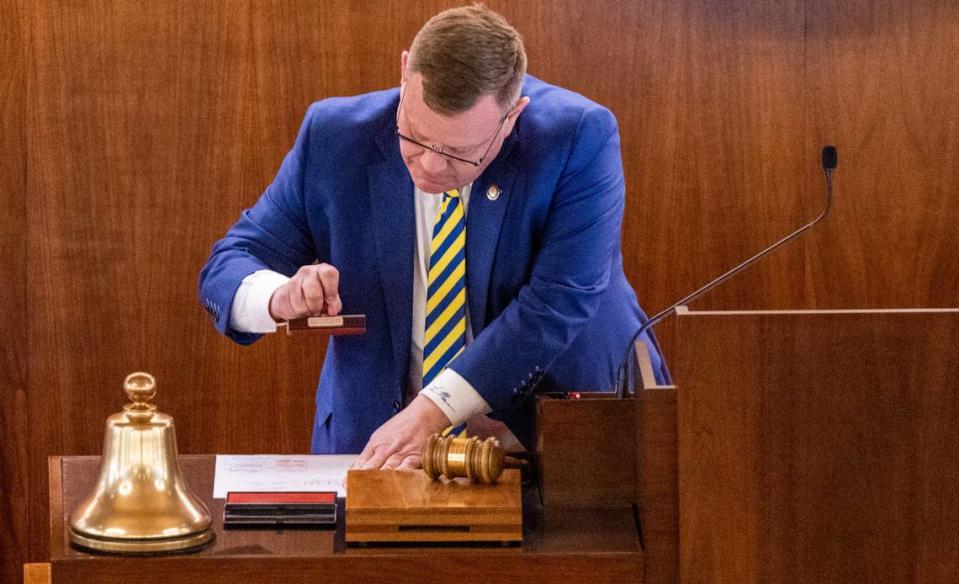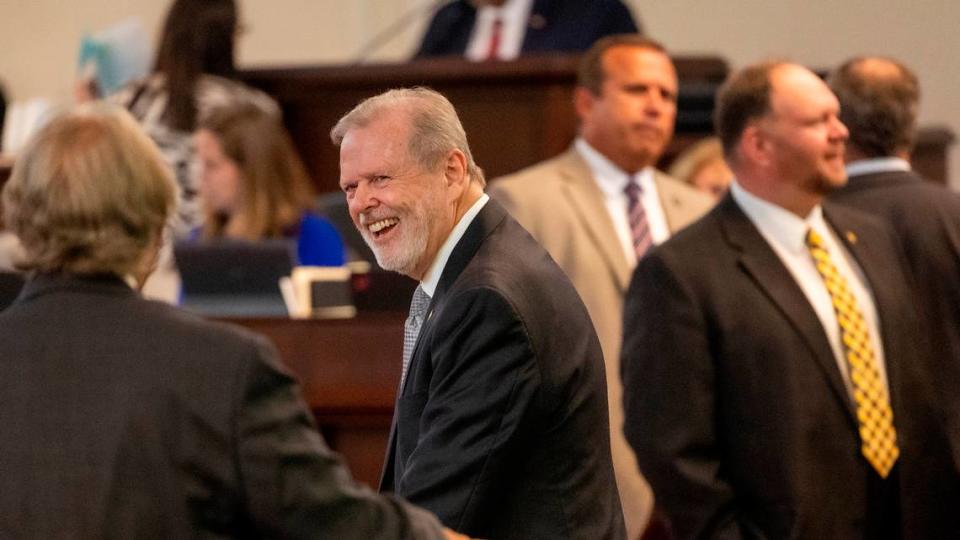NC Republicans overturned Gov. Cooper vetoes 19 times in 2023. Here’s what the laws do.
- Oops!Something went wrong.Please try again later.
Democratic Gov. Roy Cooper vetoed 19 bills in 2023, and Republicans overturned them 19 times.
Republicans have a veto-proof supermajority, by just one vote, in both the House and the Senate. That means for every veto from Cooper, Republican lawmakers have the power to overturn it, and hence pass what they want into law.
The bills Cooper vetoed during the legislative session that ended last week — all now law — ranged from abortion restrictions to shifting power away from the governor and to the legislature. Some are already in court.
Here’s a rundown of the 2023 veto overrides and what they changed for North Carolina.

Guns, abortion, race were first overrides
▪ Senate Bill 41: This bill, titled “Guarantee 2nd Amendment Freedom and Protections,” repealed the requirement that buyers of handguns get a permit.
The vote on the floor March 29 was the most dramatic of the session in the House, because it was before that chamber had a supermajority.
Cooper’s veto of the pistol permit repeal had already been overridden in the Senate, but to overturn a veto successfully, both chambers must vote to override it. Republicans started the legislative session with asupermajority, which is three-fifths, in the Senate but not the House.
The math needed to get to that three-fifths supermajority changed because a few Democrats were absent. Among them were then-Democratic Rep. Tricia Cotham of Mint Hill.
Minutes after session started, Republican House Rules Chair Destin Hall cut off debate and went forward with the vote. House Minority Leader Robert Reives, a Chatham County Democrat, called the lack of debate before the vote “disturbing.”
This was the first House override since 2019. It turned the tide of overrides, with Republicans swiftly overturning many of Cooper’s vetoes throughout the session.
Within days, Cotham switched parties to Republican, giving Republicans a supermajority in the House, and hence in the entire legislature.
▪ Senate Bill 20: The second override was a bill about a major issue: abortion. Cooper turned his veto of SB 20, which restricted abortion after 12 weeks, into a rally with abortion rights supporters in May. The event followed the vote on abortion restrictions being fast-tracked through the House and Senate days after they were revealed by Republicans as what they described as a policy compromise among themselves.
The new state law that became effective July 1 bans most abortions after 12 weeks. The law has exceptions for rape and incest up to 20 weeks and up to 24 weeks for “life-limiting” fetal anomalies. There is no restriction on abortion if the life of the mother is deemed to be at risk. The override vote in the General Assembly fell completely along party lines, with all Republicans for and all Democrats against.

▪ Senate Bill 364: As the legislative session progressed, Republicans began overriding multiple Cooper vetoes in one day. That was the case in June, when the Senate was the first to override SB 364, which limits how race and gender can be discussed in state government workplaces. The law also prevents state employees from asking job applicants questions about their “beliefs, affiliations, ideals, or principles regarding matters of contemporary political debate or social action as a condition of employment.” The bill was criticized as a way to limit organizations’ diversity, equity and inclusion, known as DEI, practices.
That same day, the Senate overrode three more vetoes, which the House also overrode a week later:
▪ Senate Bill 299, which penalizes local governments for late audits. Both Republican State Treasurer Dale Folwell and Democratic State Auditor Beth Wood supported the override.
▪ Senate Bill 331, which amends the Consumer Finance Act; and
▪ Senate Bill 329, which amends the Retail Installment Sales Act.
Two more vetoes were overturned before the end of June:
▪ House Bill 750, which prohibits the state pension fund from investing based on companies’ environmental, social or governance policies.
▪ Senate Bill 582, the North Carolina Farm Act of 2023, which would loosen state protections for wetlands by matching them with the federal government’s standards. The Farm Act override won support from a handful of House Democrats.
Transgender issues
While the General Assembly is totally controlled by Republicans, that doesn’t mean they always agree. Lawmakers were unable to reach a deal on the state budget by a July 1 deadline. They took a summer break for several weeks while House Speaker Tim Moore and Senate leader Phil Berger continued to negotiate a budget deal. When lawmakers finally returned — still without a budget — in August, they overturned more vetoes.
Six vetoes were overridden on one day, three of which were new laws impacting LGBTQ+ people and drew protesters.
▪ Senate Bill 49: Called the “Parents’ Bill of Rights,” the new law bans “instruction on gender identity, sexual activity, and sexuality” in kindergarten through fourth grades. It also requires schools to inform parents if a student goes by a different name or pronoun.

▪ House Bill 574: Titled “Fairness in Women’s Sports Act,” it bans transgender youth from competing on women’s high school and college sports teams.
▪ House Bill 808, which bans gender transition care for minors.
Equality NC Executive Director Kendra Johnson said the trio of bills, when passed this summer, would “tarnish North Carolina’s reputation as an inclusive and welcoming place to live, work, and visit — and they would cause immense damage to transgender and queer youth, who already experience significant disparities.”

The other three of Cooper’s vetoes overridden the same day in August were:
▪ House Bill 488: Code Council Reorganization and Various Code Amendments;
▪ House Bill 618: Charter School Review Board; and
▪ House Bill 219: Charter School Omnibus.
Separation of powers, elections
With the state budget deal not reached until fall, Republicans waited until October to override more vetoes. They included vetoes of bills taking appointment power away from the governor.
While the final work of the legislative session in October involved redistricting, those bills about election maps are not subject to the governor’s veto.

Here are the last five vetoes overridden this year:
▪ Senate Bill 747, which eliminates a three-day, post-election grace period for receiving mailed ballots, and empowers partisan poll observers. The law already faces multiple lawsuits.
▪ Senate Bill 512: Already challenged by Cooper in a lawsuit that was partially blocked in court this week, SB 512 takes some appointment power from the governor over boards and commissions and gives it to the General Assembly. Litigation was expected from the start.
▪ Senate Bill 749: Another bill stripping Cooper’s appointments, this time to elections boards, the bill also makes the boards evenly bipartisan. This one also swiftly resulted in a lawsuit.
▪ Senate Bill 678: The bill changes how clean energy is described, adding nuclear energy; and
▪ House Bill 600: Regulatory Reform Act of 2023.
As of Nov. 1, there are two bills waiting for action from Cooper. Both were passed Oct. 25 before the legislature adjourned, and are about senior care and various criminal and civil law changes.

